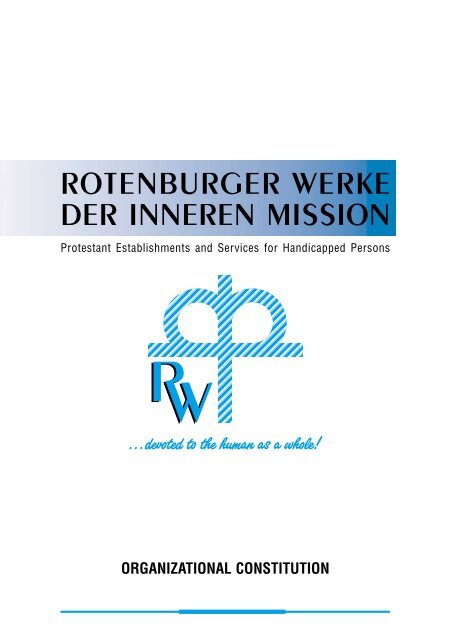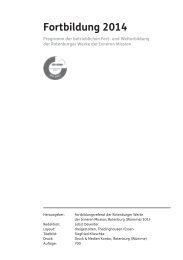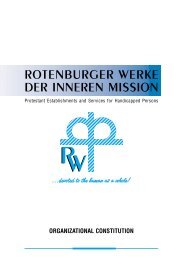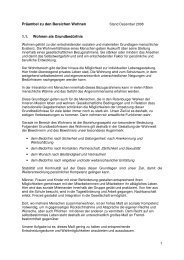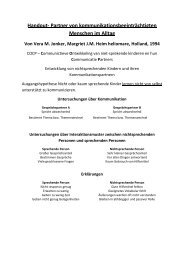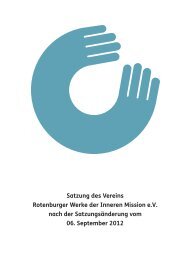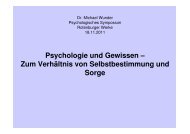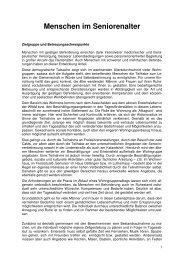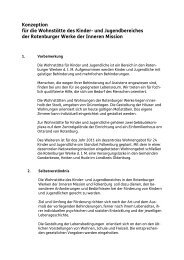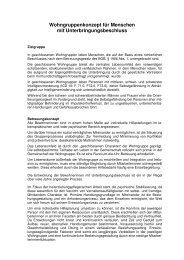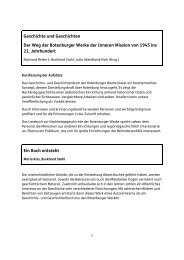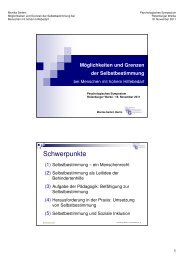ROTENBURGER WERKE DER INNEREN MISSION
ROTENBURGER WERKE DER INNEREN MISSION
ROTENBURGER WERKE DER INNEREN MISSION
You also want an ePaper? Increase the reach of your titles
YUMPU automatically turns print PDFs into web optimized ePapers that Google loves.
<strong>ROTENBURGER</strong> <strong>WERKE</strong><br />
<strong>DER</strong> <strong>INNEREN</strong> <strong>MISSION</strong><br />
Protestant Establishments and Services for Handicapped Persons<br />
...devoted to the human as a whole!<br />
ORGANIZATIONAL CONSTITUTION
Bernd Röhrs, 1992<br />
„Ein Mensch“ – Öl auf Karton
<strong>ROTENBURGER</strong> <strong>WERKE</strong> <strong>DER</strong> <strong>INNEREN</strong> <strong>MISSION</strong><br />
Protestant Establishments and Services for Handicapped Persons<br />
...devoted to the human as a whole!<br />
The Rotenburger Werke der Inneren Mission e.V. support different establishments<br />
and services for persons with mental, physical and emotional<br />
handicaps. They work with the goal of assisting handicapped persons in<br />
leading a selfdetermined and independent life integrated, as far as is possible<br />
for each individual, into the general society.<br />
ORGANIZATIONAL PHILOSOPHY<br />
The Rotenburger Werke der Inneren Mission e.V. interpret their work as<br />
the attempt to enable persons to experience that God gives all man equal<br />
dignity and equal rights in life. They are a place in which the brotherly<br />
love that Jesus Christ lived and testified to shall be accomplished in a<br />
concrete form demonstrated by respect for the individual dignity. For the<br />
future they also place themselves in the tradition of the Innere Mission<br />
which as a spiritual movement has had a major influence on the social<br />
culture in our country and in which the pledge for justice and the testimony<br />
of the love of God belong together.<br />
The Rotenburger Werke der Inneren Mission e.V. stand for professionally<br />
qualified aid that is adjusted to the particular needs of each person.<br />
They commit themselves to providing the content, extent and the quality<br />
of services that have been agreed upon.<br />
The Rotenburger Werke der Inneren Mission e.V. see themselves as a<br />
„Diakonisches Unternehmen“ (a Protestant social welfare enterprise).<br />
Standards that fundamentally apply to business organizations must be set<br />
for all their establishments and services. Inherent to these standards are<br />
integral thinking, goal orientated and economic conduct, quality consciousness,<br />
a clear distribution of competences and responsibilities as well<br />
as transparency and efficiency of procedures.<br />
1
PREFACE<br />
The organizational constitution presented including the guide lines of the<br />
Rotenburger Werke der Inneren Mission as well as the complete renovation<br />
of the organizational structure with new institutional statutes are the<br />
results of an approximate five-year-process of goal planning. Even<br />
though this process has, for the moment, come to an end, the orientation<br />
towards the future will remain a permanent responsibility.<br />
We are conscious of the fact that in an “organizational constitution” not<br />
all tensions nor discontinuities can be made clear which handicapped persons<br />
in particular experience in their lives; tensions and discontinuities<br />
which we, too, feel in our work and for which we carry part of the responsibility.<br />
We thank all those who in any way have been involved in the process of<br />
goal planning of the Rotenburger Werke der Inneren Mission.<br />
27356 Rotenburg (Wümme), May 28th, 1997<br />
The Committee of Trustees<br />
The Directing Commitee<br />
during the process of goal planning<br />
The present text is the translation of the revised second edition of the<br />
organizational constitution.<br />
Rotenburg (Wümme), August 10th, 2000<br />
The Committee of Trustees and Board of Directors<br />
of the Rotenburger Werke der Inneren Mission<br />
2
CONTENTS<br />
I. General Principles<br />
1. Who We Are – The Rotenburger Werke der Inneren Mission e.V.<br />
2. What Defines Us<br />
3. Our Goals<br />
4. Our Principles of Conduct<br />
II. Living Spheres<br />
1. The Framework<br />
2. Special Situations and Special Needs<br />
3. Living<br />
4. Education<br />
5. Occupational Activities/Work<br />
6. Leisure Time<br />
7. Health<br />
8. Parish Life<br />
9. Central Services<br />
III. A protestant Social Welfare Enterprise<br />
– „Diakonisches Unternehmen“ –<br />
1. Fundamentals<br />
2. Our Organization<br />
3. Entrepreneurial Conduct<br />
4. Employees<br />
4.1 Fundamentals<br />
4.2 Organization of the Work Process<br />
4.3 Education<br />
4.4 Further Education<br />
4.5 Employee Participation<br />
5. Partaking in the Communal and Regional Life<br />
6. Public Relations<br />
3
I. GENERAL PRINCIPLES<br />
1. Who We Are - The Rotenburger Werke der Inneren Mission e.V.<br />
The Rotenburger Werke der Inneren Mission support different establishments<br />
and services for persons with mental, physical or emotional handicaps.<br />
They are a registered, non-profit-making society, member of the<br />
Diakonisches Werk (Protestant social welfare work organization) of the<br />
Lutheran Church of Hannover as well as member of the Bundesverband<br />
Evangelische Behindertenhilfe (BEB) (Association of Prostestant institutions<br />
for the aid of handicapped persons).<br />
2. What Defines Us<br />
„The dignity of man is inviolable. It is the responsibility of all state power<br />
to respect and defend it.“ (Art. 1 of the German Federal Constitution).<br />
With their work the Rotenburger Werke der Inneren Mission want to<br />
make a contribution to ensure that the declaration in<br />
Art. 1 of the German Federal Constitution is a reliable framework for<br />
handicapped persons in the organization of their lives. The dignity of man<br />
includes his entire existence with its various needs. Our work is devoted<br />
to the human as a whole. Included in these needs are:<br />
• Eating and drinking<br />
• Care and clothing<br />
• Housing<br />
• Education<br />
• Communication<br />
• Social relations and belonging<br />
• Love and sexuality<br />
• Security and appreciation<br />
• Confidence and faith<br />
• Freedom and self-determination<br />
• Responsibility<br />
The Rotenburger Werke der Inneren Mission interpret their work as<br />
the attempt to enable persons to experience that God gives all man<br />
equal dignity and equal rights in life. They are a place in which the brotherly<br />
love that Jesus Christ lived and testified to shall be expressed<br />
concretely in the form of respect of the individual dignity. The commandment<br />
of brotherly love is founded on the experience of the love of<br />
God. This experience is beyond our disposal. In this respect, the success<br />
of Protestant social welfare work and of all our life endeavours is<br />
regarded as a gift and our conduct founded on hope.<br />
4
3. Our Goals<br />
The name of our establishments and services contains the term „Innere<br />
Mission“. In this we express part of our origins. Not all original intentions<br />
of the Innere Mission are applicable in the present time. What has remained<br />
is the intention derived from the Gospel of Jesus Christ to create a<br />
social culture in which the pledge for justice and the testimony of the love<br />
of God are combined.<br />
Within this goal setting we try to create conditions that enable handicapped<br />
persons<br />
• to lead a life in a community<br />
• to claim their rights<br />
• to secure their needs even in adverse conditions.<br />
We want that handicapped persons are able to lead a life in the general<br />
society which is self-determined in accordance with the capacity of each<br />
individual and which is as independent as possible.<br />
4. Our Principles of Conduct<br />
We commit ourselves to a culture of helping, by which we respect the<br />
person in need of help. Initially we assist the persons to understand their<br />
possibilities and limitations for an autonomous life organization. Then<br />
we discuss the individual needs of the persons affected with the persons<br />
themselves and their relatives or the people in charge of their life planning;<br />
we secure the necessary measures and translate them into action.<br />
The claiming of arranged help is, in our eyes, an expression of a selfdetermined<br />
and independent life.<br />
The form of help we render we call “assistance”. It demands human<br />
maturity and professionally competent conduct. The assisting person<br />
must be able to withdraw in situations where it is necessary. It is therefore<br />
part of our responsibility to create the right conditions for this assistance<br />
in respect of personnel and professionality.<br />
Our establishments and services are used by many people. We know that<br />
with the growing size of establishments, problems in the organization of<br />
individual life planning arise. This knowledge entails, in our opinion, the<br />
responsibility of ensuring that handicapped persons receive as many<br />
opportunities as possible to develop their personality and to lead an individually<br />
determined life. This is valid even when our institutional interests<br />
are in conflict with our responsibility. A further decentralization and<br />
differentiation of services rendered as well as the creation of out-patient<br />
services are urgent allocated responsibilities.<br />
During the course of the more than one-hundred-year old history of our<br />
establishments and services, the living conditions of handicapped persons<br />
and also the political and social framework have continuously changed.<br />
What has remained constant is the desire of the persons living here<br />
for security and community - in short: the wish for a home. Our commitment<br />
for the future is to fulfil this wish.<br />
5
II. LIVING SPHERES<br />
1. The Framework<br />
We are convinced that quality of life entails persons having different experiences<br />
in separate and different living spheres. These experiences help to<br />
develop the individual personalities. Learning to adapt to different environments<br />
through recurrent contact with people and places develops character<br />
strength. In this way a sense of home and belonging develops that does<br />
not depend on one single living sphere or on one single person alone.<br />
For this reason it is a great advantage that our establishments and services<br />
are placed in the middle of the town Rotenburg (Wümme). Almost all important<br />
destinations in town are easily within reach of handicapped persons<br />
on their own or with an escort. It is our wish that handicapped persons<br />
partake in regional and communal life as a matter of course.<br />
Living, education, occupational activities/work and the leisure time spheres<br />
are divided into separate spaces in our establishments and services.<br />
Despite this fact, the organization of the divisions is easily understandable<br />
and they are near one another. For economic reasons the variety of our<br />
programmes relates closely to the size of our different establishments.<br />
This interrelation has to be taken into consideration when a change of<br />
size is due.<br />
The Parish Life and the Integrated Health Service support the individual<br />
persons in all four of above mentioned living spheres. The Central Services<br />
as well as the Central Administration assist, support and relieve them.<br />
People need reliable limits. These protect others and the people themselves.<br />
The rights of one individual must respect the rights of others, the<br />
individual freedom must not restrict the freedom of others unreasonably.<br />
That is why rules for living together must be found which guarantee each<br />
individual his or her personal space.<br />
It is a good thing when people determine the objectives and content of<br />
their lives themselves. We see ourselves as a supporting partner in questions<br />
of life organization and we commit ourselves to accept outlines<br />
and plans for each individual as long as these do not conflict with the<br />
safety of others.<br />
6
In order to feel comfortable people need an organization of living spheres<br />
that corresponds to their person and their needs. That is the reason<br />
why the persons using our establishments and services either directly or<br />
through the body representing their interests (various represen-tatives<br />
with advisory function elected amongst and by the residents themselves<br />
and the group of external workshop users, relatives council, parentsschool-committee)<br />
cooperate in the structuring of living spheres. We are<br />
aware of the fact that through this structuring of living spheres we carry<br />
a part of the responsibility for the conduct and for the self expression of<br />
handicapped persons and thus also for their possibilities to appear in<br />
public. We understand any expression of life also as a reaction to what we<br />
are doing. We attempt to understand the meaning of these expressions<br />
and to react correspondingly.<br />
2. Special Situations and Special Needs<br />
In the course of a lifetime every person experiences his independence in<br />
different ways. Childhood, adolescence, adulthood and old age differ<br />
from one another by the extent of autonomy reached in leading one’s own<br />
life. Particular assistance is required when the life organization is impaired<br />
by events such as illness, need of care, and situations of crises, be<br />
they short term or permanent.<br />
In the near future many of the people living with us will belong to the<br />
Seniors group. This knowledge challenges us to prepare ourselves now<br />
for the growing responsibilities in regards to adequately accompanying<br />
and providing for persons in the „third phase“ of life.<br />
When people need caring aid in addition to integrational support, we offer<br />
it as long as possible in a professionally competent way in the accustomed<br />
surroundings of their home. We also attempt to accompany dying persons<br />
in their accustomed surroundings.<br />
We want people in need of particular help to be able to live as normally<br />
as possible.<br />
3. Living Sphere<br />
Every person needs his or her own „four walls“ in order to satisfy basic<br />
physical and emotional needs of living. Any person’s home is his or her<br />
private sphere and must be respected as such without restrictions. This<br />
private space gives the individual a place to retire, to relax and to regenerate<br />
while allowing communication and a sense of community.<br />
The Rotenburger Werke der Inneren Mission offer persons of any age a<br />
differentiated range of lodging possibilities. Apart from the buildings and<br />
facilities which make up two entire parts of the town Rotenburg, there are<br />
apartments and single-family-houses distributed throughout town. Each<br />
living situation is differentiated according to the number of people living<br />
7
there and to the quantity of care and support necessary. There are sheltered<br />
closed groups, but also lodgings for persons who live very independently.<br />
In particular we are expanding our supply of one-room-apartments<br />
and apartments for couples or other relationships.<br />
A conflict of goals stems from the fact that in our society handicapped<br />
persons, almost without exception, are forced to live in groups all their<br />
lives. This is not in accordance with normality. That is why we have been<br />
minimizing the size of groups for many years. Lately, the overall economic<br />
conditions have forced us to develop new models of cooperation<br />
across the group limits in order to achieve a more efficient employment<br />
of staff. While having to do this, we do attempt to counteract any possible<br />
threat to personal relations that may have developed.<br />
When persons cannot freely choose their living spheres and have to live<br />
in groups, the concept of a moderate heterogeneity has proved to work out<br />
well. Men and women, young and old persons complement one another<br />
through their different experiences and talents. Living together offers the<br />
chance to learn from one another and enriches the life of the inhabitants.<br />
The persons living there determine whether the lodging is good or bad.<br />
The statement of an inhabitant: „I like to be here, I can have good thoughts<br />
here“ does not need anything added. It comprises the quality of structures<br />
and results that we are aiming at. Still, apart from individual personal appraisal<br />
there are professionally prescribed criteria which the Rotenburger<br />
Werke der Inneren Mission use as a basis for the judgement of the supply<br />
of lodging.<br />
4. Education<br />
Every person is, according to his or her personal possibilities, capable of<br />
receiving education and has a claim to an adequate educational programme.<br />
In the process of education through dealing with his or her environment<br />
the individual experiences orientation for his or her life. Education<br />
has to be looked at from different points of view: for instance as imparting<br />
knowledge, developing skills and as a strengthening of the personality.<br />
We advocate an integrative concept of education. For this reason we<br />
are seeking cooperation with state schools and establishments of extracurricular<br />
purposes and are looking for ways for persons with and without<br />
a handicap to learn together.<br />
According to the Law of Education of Niedersachsen (Lower Saxony)<br />
school attendance is also compulsory for mentally handicapped children<br />
and adolescents. The Rotenburger Werke der Inneren Mission comply<br />
with this educational obligation by their support of a state recognized<br />
school for mentally handicapped persons which is also attended to by<br />
external pupils from the district of Rotenburg. We strive for a better orginized<br />
professional education. Our aim is to educate handicapped persons<br />
for vocational jobs. We are able to provide a wide variety of adult education.<br />
For the future we are working towards an improvement and<br />
expansion of the adult education.<br />
8
5. Occupational Activities/Work<br />
Work is a normal part of adult life. According to age, interests, knowledge,<br />
and skills people seek different fields of activities and vocations.<br />
Work structures the course of the day, the week and the year and makes<br />
orientation in time and space possible. Through work every person experiences<br />
meaningful elements for his or her life.<br />
The Rotenburger Werke der Inneren Mission are able to provide a differentiated<br />
range of activity areas in order to fulfil and give perspective to the<br />
individual demands of all the persons living with us. We support a recognized<br />
„Werkstatt für Behinderte“ (WfB) (Workshop for Handicapped<br />
Persons). For all persons for whom no adequate job in this workshop can be<br />
found, we offer alternative fields of activity, learning and experiences in the<br />
context of our day structuring programmes outside the permanent group.<br />
6. Leisure Time<br />
Leisure time serves equally for rest and relaxation, and also to activate<br />
physical and mental conditions.<br />
The Leisure Time division organises a wide range of common activities<br />
for persons of all ages and inclinations. The great variety of this programme<br />
is only possible due to voluntary workers. In order to encourage<br />
the participation in public life outside of the establishments, public events<br />
are attended. Apart from this, the Leisure Time division of the Rotenburger<br />
Werke der Inneren Mission organises programmes which are partly open<br />
to the citizens of Rotenburg and thereby also serve the purpose of integration.<br />
We see it as an important future responsibility to enable persons<br />
with heavy or multiple handicaps to participate in the leisure programme<br />
through intensive assistance.<br />
7. Health<br />
Prevention, early recognition and immediate treatment of illnesses and<br />
their origins are the best means to maintain good health or to recover<br />
from illness. Mentally handicapped persons often have chronic courses of<br />
illnesses and a high rate of multiple illnesses appearing in a combination<br />
of sensory and movement disorders, epilepsy, physical and mental illnesses.<br />
For this reason the Rotenburger Werke der Inneren Mission offer an<br />
Integrated Health Service with the exception of not being for the persons<br />
in the lodgings of the WfB.<br />
Doctors, psychologists, physiotherapists as well as employees from other<br />
professional groups of the general health service cooperate in our<br />
Integrated Health Service. In addition, external medical specialists are<br />
called upon.<br />
In case of extensive specific needs of medical treatment and care a treatment<br />
on the medical wards is possible. The medical emergency service<br />
and the physiotherapy section provide special services which are avilable<br />
also to out-patients.<br />
9
8. Parish Life<br />
The Rotenburger Werke der Inneren Mission regard spiritual welfare<br />
work with a view of the human as a whole as indispensible. Spiritual welfare<br />
assistance is regarded as a major responsibility. It is seen as an expression<br />
of the one undivided concern of God for the human in all matters<br />
and takes place in cooperation with other professional disciplines<br />
.<br />
In addition to traditional church services, we consider prayer in small<br />
groups in all living spheres important. Here, church music, with its particular<br />
forms of expression, plays an important role.<br />
Specific educational programmes are aimed at the spiritual, pastoral and<br />
interhuman competences. They help participants to reflect their own faith<br />
and to gain new meaning in their faith. The programmes render motivation<br />
to act in ethically responsible ways.<br />
9. Central Services<br />
The Central Services of the Rotenburger Werke der Inneren Mission provide<br />
a wide variety of financial, domestic and technical services. They<br />
manage matters of every day life and also provide WfB-jobs. All the<br />
same, necessary questions of rationalization stand in a conflict of aims<br />
with the endeavours to maintain and create new WfB-jobs.<br />
In order to secure the further existence of the establishments it is necessary,<br />
within the legal possibilities, to offer our services beyond the limits<br />
of our organization.<br />
10
1. Fundmentals<br />
In view of the unkindness and hopelessness of the real social conditions<br />
for persons in need it was a matter of concern of those who founded the<br />
Rotenburger Werke der Inneren Mission to create places in which the<br />
experience of the love of God was consciously to be hoped for and in which<br />
everything actually possible was to be done for the relief of persons in<br />
need. By this the founders “undertook” something that has absolutely<br />
worldly structures. When we talk of a „Diakonisches Unternehmen“<br />
the point is solely what responsibilities we as humans have. Our establishments<br />
and services are „secular“ and must render account according<br />
to these standards for what is done and how it is done.<br />
We ensure that our provided services correspond with the quality which is<br />
due to each individual by contract of residence and in accordance with the<br />
terms agreed upon by the paying partner. The Rotenburger Werke der Inneren<br />
Mission have therefore established quality management as a permanent task<br />
within the overall organization.<br />
We commit ourselves to use the resources at our disposal as economically<br />
as possible. Because they know that all resources are limited, the Rotenburger<br />
Werke der Inneren Mission endeavour to be good budget managers.<br />
To us conservation of God’s Creation is a challenge. The Rotenburger Werke<br />
der Inneren Mission acknowledge the necessity of the development of long<br />
lasting econimics obtained through durability, repairability and recycling<br />
of products.<br />
III. PROTESTANT SOCIAL WELFARE ENTERPRISE<br />
2. Our Organization<br />
The Rotenburger Werke der Inneren Mission are a registered society. The<br />
society comprises Members’Assembly, Committee of Trustees and Board<br />
of Directors.<br />
The Board is responsible for the interactive management of the establishments<br />
and services, even when individual responsibilities have been distributed.<br />
The managers of different departments and divisions are responsible for<br />
their specific fields of work. Further decentralized departments with their<br />
own management profiles are the different spheres as well as the groups<br />
and divisions.<br />
11
In all levels of management decisions must be made by the persons in<br />
charge as relevant to the situation, but only after obligatory consultations.<br />
These take place, for example, between the Board and the management<br />
personnel of the departments and the divisions as well as between the<br />
management personnel and the residents in regular common meetings<br />
with the elected residents’ representatives and workshop users’ representatives.<br />
3. Enterpreneurial Conduct<br />
Our entrepreneurial conduct is orientated by management models that<br />
aim at a participation by all employees in the responsibility for our establishments<br />
and services. To promote this we have created a distinct organizational<br />
structure with clearly described functions and competences as<br />
well as with comprehensible procedures and regulations for cases of<br />
overlapping interests.<br />
We work goal orientated. Goal orientated conduct can be described in<br />
relation to Bible tradition as „to find one’s way“, „to direct along one’s<br />
way“, and „to accompany along one’s way“.<br />
• In the goal finding process „finding one’s way“ means to allow<br />
employees and also those who use our programmes to be involved<br />
participants and not only affected persons. A realistic analysis of<br />
the situation is only possible when different points of view are<br />
brought together and evaluated.<br />
• „Directing along one’s way“ permits that the fundamentals of the<br />
Rotenburger Werke der Inneren Mission as well as the goals that<br />
have been agreed upon are being kept to. This also applies to time<br />
plans in the realization of goals.<br />
• „Accompanying along one’s way“ describes the purpose of developing<br />
a system of assessment as well as a feed-back-culture. In<br />
difficult phases we encourage each other. Justified praise expresses<br />
appreciation. Critisism must be factual and constructive. Thus we<br />
bring about necessary corrections.<br />
4. Employees<br />
4.1 Fundamentals<br />
Our employees work for us for different motives. From all of them we<br />
expect the recognition of the principals of our organizational constitution<br />
and the compliance with prescribed ways of dealing not only with persons<br />
who use our programmes, but also with one another within the<br />
group of employees.<br />
The Rotenburger Werke der Inneren Mission do not want to judge<br />
employees solely from their part of the fulfilling of the organizational<br />
goals nor reduce the image of them to the work rendered. Still we know<br />
that the question of achievement in relation to preset goals is indispensible,<br />
because only with this point of view can the quality of programmes<br />
12
promised to the persons seeking help be ensured. We are conscious of the<br />
fact that a permanent tension exists between a necessary entrepreneurial<br />
conduct and the view of the human as a whole.<br />
It is necessary that employees have personal, professional and social<br />
competences.<br />
The employees must be conscious of the fact that the changing framework<br />
in the social sector also increasingly demands an economic way of<br />
thinking.<br />
4.2. Organization of the Work Process<br />
A range of framework conditions exert a dicisive influence upon the working<br />
situation of our employees: for example through an agreed upon<br />
salary, the attractive organization of the work place, a clear organizational<br />
structure, a wide variety of educational seminars and offers of further<br />
education, transparent work procedures, and the possibility of being individually<br />
responsible for one’s own work area. In addition to this it is of<br />
importance to what extent employees may be involved in the sharing of<br />
responsibility for the whole organization.<br />
In our work we often deal with complex procedures which, because of<br />
the professional as well as temporal requirements, can only be managed<br />
through division of labour. For this reason interdisciplinary work within<br />
the team is necessary.<br />
We would like our employees to work as partners able to express mutual<br />
esteem and acceptance. Conflicts are understood as expressions of different<br />
experiences and reactions to experiences of life which must be transferred<br />
into a conception of common conduct.<br />
Through consultations, supervision and assistance in the practical work<br />
the Rotenburger Werke der Inneren Mission offer help in order that<br />
employees gain new views into the development of conceptions and do<br />
not “burn out” in the process of work. Distribution of responsibilities<br />
depends on organizational demands and on the individual professional<br />
qualifications.<br />
Employees can be placed in areas of working suiting their individual<br />
capacities for stress and work demands in accordance to their age, chronic<br />
illness or handicaps.<br />
Periods of practical training, community service and the Voluntary Social<br />
Year serve to help young people to orientate themselves professionally.<br />
Those who are working with us in such functions are employed in many<br />
areas and assume important supporting responsibilities.<br />
Voluntary helpers enrich our work. Through personal contact and escort<br />
on particular occasions their work brings a different quality to the relations<br />
to the persons living with us. They present these with additional possibilities<br />
of partaking in the community life. Volunteer workers in our<br />
employment are accompanied by full-time employees.<br />
13
4.3. Education<br />
The Rotenburger Werke der Inneren Mission can look back upon a long<br />
tradition of education. We know that we can maintain and develop our<br />
professional standards only if we establish an adequate relation between<br />
theory and practical experience. The Rotenburger Werke der Inneren<br />
Mission run their own state recognized school for medicinal-educational<br />
care and medicinal-educational assistance and provide the students with<br />
areas for practical training.<br />
Furthermore we consider it our duty to provide vocational placements in<br />
the administrative and technical areas.<br />
4.4. Further Education<br />
We ensure the preservation and extension of our professional standards<br />
by means of further education within the organization. The measures orientate<br />
themselves to the concept of the working place, to the previous and<br />
continuous education, and to the position of the employees.<br />
We also understand further education as a business management necessity<br />
in order to preserve and stimulate our man power and its motivation as<br />
well as for the development of the professional, social and personal competences<br />
of our employees.<br />
Further education, accompaniment at the work place, and concept development<br />
are essentially interrelated instruments for developing professional<br />
conduct.<br />
4.5. Employee Participation<br />
In accordance with the Law of Employee Representation passed by the<br />
Konföderation evangelischer Kirchen in Niedersachsen (Confederation<br />
of Protestant Churches in Lower Saxony) the Employee Representation<br />
(Mitarbeitervertretung or MAV) and the Board of the Rotenburger Werke<br />
der Inneren Mission as well as top managers and other employees in<br />
management functions cooperate as partners trusting one another in order<br />
to realize the goals of our establishment.<br />
In order that the MAV may fulfil its purposes constructively it receives<br />
timely and comprehensive informations during the preparation of decisions.<br />
5. Partaking in the Communal and Regional Life<br />
We are an active part of the town and district of Rotenburg (Wümme).<br />
The integration of the Rotenburger Werke der Inneren Mission in the<br />
region is taking place through all of the persons living and working here.<br />
Through their individual social role they all are representatives of our<br />
establishments and services. With their participation in social life they<br />
convey an image of the Rotenburger Werke der Inneren Mission and of<br />
14
the life and work in this organization. As an enterprise the Rotenburger<br />
Werke der Inneren Mission are an employer, a business partner, and a<br />
representative of social welfare work (“diakonische Arbeit”) in practice<br />
with a socio-political emphasis.<br />
The Rotenburger Werke der Inneren Mission are a place of encounters.<br />
We consciously place our establishments at the disposal of parishes, of<br />
the town and of the administrative district of Rotenburg as well as of<br />
associations and organizations of the region.<br />
6. Public Relations<br />
The Rotenburger Werke der Inneren Mission are in the focus of public<br />
attention. That is why we inform about the work and the development of<br />
our establishments and services through the media, but also by inviting<br />
guests.<br />
The public relations work of the Rotenburger Werke der Inneren Mission<br />
support handicapped persons in their efforts to represent their opinions<br />
and matters of concern in public.<br />
The internal public relations work is of just as big importance. Extensive<br />
information to the persons living and working here is a prerequisite for a<br />
good cooperation and for the successful perception of the responsibilities<br />
of our establishments and services.<br />
15
HISTORICAL SYNOPSIS<br />
1877 The accident of an epileptic woman leads to the first considerations<br />
of providing help for epileptic persons in the<br />
church district of Rotenburg<br />
18.3.1878 The statutes of the “Verein zur Pflege Epileptischer”<br />
(Association for the care of epileptic persons) founded in<br />
Rotenburg are passed<br />
1880 Purchase of a small house. On the 4th of June 1880 the “Asyl<br />
für die Pflege Epileptischer” (Asylum for the care of epileptic<br />
persons) is inaugurated by superintendent Kottmeier as founder<br />
and first head of the establishment<br />
1897 150 persons are living in the establishment<br />
1905 Deaconesses from the Lutheran Deaconess-Motherhouse<br />
Bethesda come from Hamburg to take over the care of the<br />
at this point 300 inhabitants<br />
1909 State recognition achieved through the province government<br />
for the establishment-internal private special school<br />
1912 Inauguration of the parish church “Zum Guten Hirten”<br />
(The Good Shephard)<br />
1929 Take over of the Kalandshof, a previous privately run<br />
welfare establishment<br />
1930 50-years celebration. Renaming of the previous “Asyl für<br />
Epileptische und Idioten” (Asylum for epileptic and idiots)<br />
into “Rotenburger Anstalten der Innere Mission, Heil- und<br />
Pflegeanstalt für Epileptische, Geistesschwache und -kranke”<br />
(Rotenburg Institutions of the Inner Mission, medicinal and<br />
nursing institution for epileptic, mentally disturbed and<br />
mentally ill persons)<br />
1934-1945 Sterilisation of 97 female and 238 male inhabitants in the<br />
hospital of the Deaconess-Motherhouse. Two young women die<br />
1940 First news about specific state measures towards the destruction<br />
of “unworthy life”. The management of the Institutions<br />
refuses to fill in the received patients questionnaires<br />
21.9.1940 Deportation of one female and two male jewish inhabitants<br />
24.4.1941 A medical commission arrives “in order to relieve the<br />
Institutions of the work with the questionnaires”. Beginning<br />
of the deportation of inhabitants on the background of the<br />
programme of euthanasia of the Third Reich. Until today 549<br />
victims of this programme who were deported and murdered<br />
are known by name<br />
Autumn 1941The Rotenburg Institutions are turned into a reserve military<br />
hospital. Except for 240 employed inhabitants all others are<br />
transferred to other establishments. On the Kalandshof area,<br />
houses for an alternative hospital for Bremen are built<br />
1945 The alternative hospital for Bremen on the Kalandshof area<br />
is closed; a hospital for internees is established by the Allied<br />
Forces<br />
1949 Requisitioned houses are given back. A part of the evacuated<br />
inhabitants is being transferred back<br />
16
1960 Establishment of a “Schwesternwohnheim” (Hall of residence<br />
for nurses and deaconesses) and of the Hof Königskamp<br />
(Königskamp farm) as a center of extensive agriculture<br />
1966-1970 Establishment of the houses Hannover and Bremen for children<br />
and adolescents as well as the house Niedersachsen with a<br />
multipurpose hall, an indoor swimming pool and rooms for<br />
physiotherapy<br />
1972 Establishment of the “Fachschule für Heilerziehungspflege/<br />
Berufsfachschule für Heilerziehungshilfe” (College of medicinaleducational<br />
care/vocational school for medicinal-educational<br />
assistance)<br />
1976 The house Göttingen is inaugurated. The last houses in use by<br />
the Diakonie-hospital on the area of the Kalandshof are<br />
given back to the Rotenburg Institutions<br />
1985 Reorganization of the Lutherhaus as a place of encounters<br />
1985 Inauguration of the new schoolbuilding of the Lindenschule<br />
1987 Establishment of the market-garden in Lindenstraße<br />
1993 Inauguration of the “Förderzentrum auf dem Kalandshof”<br />
(Center of support on the Kalandshof)<br />
1994 The “Fachschule für Heilerziehungsspflege/Berufsfachschule<br />
für Heilerziehungshilfe” (College of medicinaleducational<br />
care/vocational school for medicinal-educational<br />
assistance) moves to new premises in the previous preachers’<br />
seminary<br />
1995 Establishment of a “Wohnheim an der WfB” (Lodging at the<br />
Workshop for Handicapped Persons). Founding of an<br />
“Anerkannte Werkstatt für Behinderte” (WfB) (State recognised<br />
Workshop for Handicapped Persons)<br />
17.4.1996 The Members’Assembly passes the new statutes and decides<br />
the new name:<br />
<strong>ROTENBURGER</strong> <strong>WERKE</strong> <strong>DER</strong> <strong>INNEREN</strong> <strong>MISSION</strong> e.V.<br />
May 1996 Inauguration of the new Central Kitchen<br />
28.5.1997 The Committee of Trustees and the Directing Committee of<br />
the goal planning process pass the organizational constitution<br />
and the guide lines.<br />
1998 / 1999Inauguration of new dwelling-houses of the “Wohnheim an<br />
der WfB” (Lodging at the Workshop for Handicapped Persons).<br />
1999 Establishment and application of a quality system according<br />
to EN ISO 9002<br />
Inauguration of a new market garden
Mitglied im Diakonischen Werk<br />
der Evangelisch-lutherischen Landeskirche Hannovers<br />
Lindenstraße 14 • 27356 Rotenburg (Wümme)<br />
Telefon : 04261/ 920 – 0<br />
Telefax : 04261/ 920 – 300<br />
Internet : www.rotenburgerwerke.de<br />
E-Mail : info@rotenburgerwerke.de


